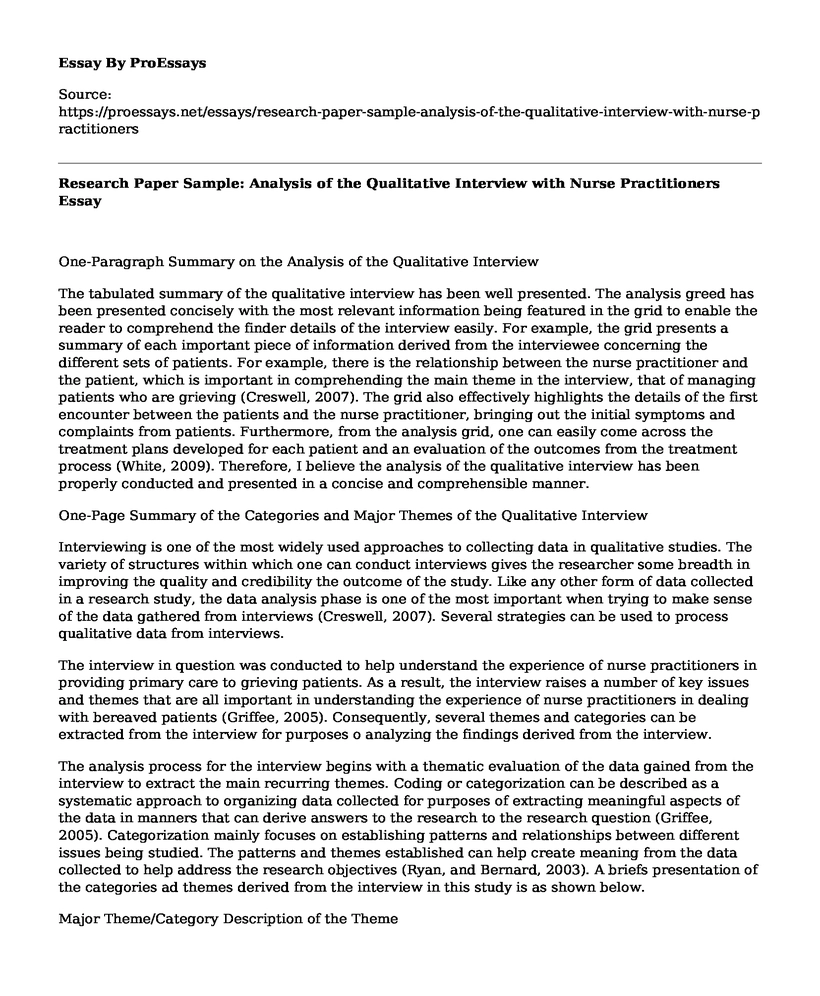One-Paragraph Summary on the Analysis of the Qualitative Interview
The tabulated summary of the qualitative interview has been well presented. The analysis greed has been presented concisely with the most relevant information being featured in the grid to enable the reader to comprehend the finder details of the interview easily. For example, the grid presents a summary of each important piece of information derived from the interviewee concerning the different sets of patients. For example, there is the relationship between the nurse practitioner and the patient, which is important in comprehending the main theme in the interview, that of managing patients who are grieving (Creswell, 2007). The grid also effectively highlights the details of the first encounter between the patients and the nurse practitioner, bringing out the initial symptoms and complaints from patients. Furthermore, from the analysis grid, one can easily come across the treatment plans developed for each patient and an evaluation of the outcomes from the treatment process (White, 2009). Therefore, I believe the analysis of the qualitative interview has been properly conducted and presented in a concise and comprehensible manner.
One-Page Summary of the Categories and Major Themes of the Qualitative Interview
Interviewing is one of the most widely used approaches to collecting data in qualitative studies. The variety of structures within which one can conduct interviews gives the researcher some breadth in improving the quality and credibility the outcome of the study. Like any other form of data collected in a research study, the data analysis phase is one of the most important when trying to make sense of the data gathered from interviews (Creswell, 2007). Several strategies can be used to process qualitative data from interviews.
The interview in question was conducted to help understand the experience of nurse practitioners in providing primary care to grieving patients. As a result, the interview raises a number of key issues and themes that are all important in understanding the experience of nurse practitioners in dealing with bereaved patients (Griffee, 2005). Consequently, several themes and categories can be extracted from the interview for purposes o analyzing the findings derived from the interview.
The analysis process for the interview begins with a thematic evaluation of the data gained from the interview to extract the main recurring themes. Coding or categorization can be described as a systematic approach to organizing data collected for purposes of extracting meaningful aspects of the data in manners that can derive answers to the research to the research question (Griffee, 2005). Categorization mainly focuses on establishing patterns and relationships between different issues being studied. The patterns and themes established can help create meaning from the data collected to help address the research objectives (Ryan, and Bernard, 2003). A briefs presentation of the categories ad themes derived from the interview in this study is as shown below.
Major Theme/Category Description of the Theme
Coping Mechanisms - Each of the patients has different mechanisms for coping with grief
Obliviousness of Grief - Some patients may not be in a position to understand that their problems are associated with grief
Familiarity with Patients - The nurse practitioner is able to understand the situation of patients based on the familiarity created by previous visits
Review the Summary of the Findings of the Qualitative Study
The article is based on data collected from semi-structured audiotaped interviews the researchers conducted with nine nursing practitioners (NPs) that were actively involved in providing primary care to clients were completed (White, 2009). The sets of data collected form the interviews were analyzed using qualitative content analysis to come up with relevant appropriate findings (White, 2009). The analysis process began with a transcription of the recorded interviews. The findings of the study were able to adequately answer the research questions.
References
Creswell, J.W. (2007). Qualitative inquiry and research design: Choosing among five approaches (2nd ed.). Thousand Oaks,. CA: SAGE.
Griffee, D. T. (2005). Research Tips: Interview Data Collection. Journal of Developmental Education, 28(3), 36-37.
Ryan, G.W., and Bernard, H. R. (2003). Techniques to Identify Themes. Field Methods, 15(1), 85109.
White, P. (2009). Exploration of nurse practitioner practice with clients who are grieving. Journal of the American Academy of Nurse Practitioners 21, 231240
Cite this page
Research Paper Sample: Analysis of the Qualitative Interview with Nurse Practitioners. (2021, Jul 17). Retrieved from https://proessays.net/essays/research-paper-sample-analysis-of-the-qualitative-interview-with-nurse-practitioners
If you are the original author of this essay and no longer wish to have it published on the ProEssays website, please click below to request its removal:
- Paper Example on Childhood Obesity
- Impacts of Cancer on the Mental Health of School-Going and Cancer Patients
- Conducting Research on the Internet Paper Example
- Uber PESTLE Analysis Paper Example
- Couple Delivers First Baby at Evanston Hospital: Case Study
- Essay on Group Living Inc: Providing Assistance & Empowerment to Adults with Disabilities
- Paper Example: International Disaster Risk Factors







